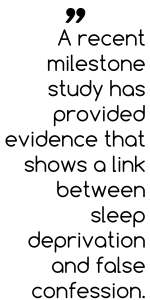When Damon Thibodeaux confessed to the rape and murder of his 14-year old cousin Crystal Champagne in Louisiana in 1996, he had been subjected to an all-night interrogation and had been up the previous night searching for his cousin. DNA evidence later confirmed that Thibodeaux was innocent, but his false confession proved costly. Thibodeaux spent 15 years in solitary confinement on death row until his release.
 False confessions occur with surprising frequency. The campaign group the Innocence Project estimates that up to a quarter of wrongful convictions in the US are a result of false confessions. In many situations like Thibodeaux’s, the suspect suffered from severe sleep deprivation during their police interviews.
False confessions occur with surprising frequency. The campaign group the Innocence Project estimates that up to a quarter of wrongful convictions in the US are a result of false confessions. In many situations like Thibodeaux’s, the suspect suffered from severe sleep deprivation during their police interviews.
A recent milestone study has provided evidence that shows a link between sleep deprivation and false confession. Eighty-eight study participants were asked to complete various computer tasks as part of a fake experiment. The participants later returned to complete more tasks, and then either slept or stayed awake all night. In the morning, the researchers falsely accused the participants of losing the data of the fake study by pushing the escape key. None of the participants had actually pressed the escape key or lost any data, but half of the sleep deprived participants agreed to sign a confession of guilt to losing the data, while only 18 per cent of the well-rested participants were willing to sign a confession. Legal experts predict that this study may be cited in future legal battles where false confession is believed to have occurred, as this is the first study to show a link between false confession and sleep deprivation.
Sleep deprivation has long been used as a tactic in police interrogations, but the practice has been outlawed in the UK after a rash of miscarriages of justice during the 1970s. But the US and many other countries do not have laws that prohibit sleep deprivation tactics.
To many, it might seem unbelievable that false confessions could occur with such frequency, but experts say that suspects often confess because they believe that the evidence will eventually prove their innocence. After being allowed to rest, these suspects often retract their confessions. But by then it is often too late as the police investigation changes course and the defense loses ground.
The study is not the perfect legal defense for false confessions in cases of sleep deprivation, but it is an important first step toward changing false confession trends and implementation of laws requiring interrogation suspects to be given a chance to sleep.


